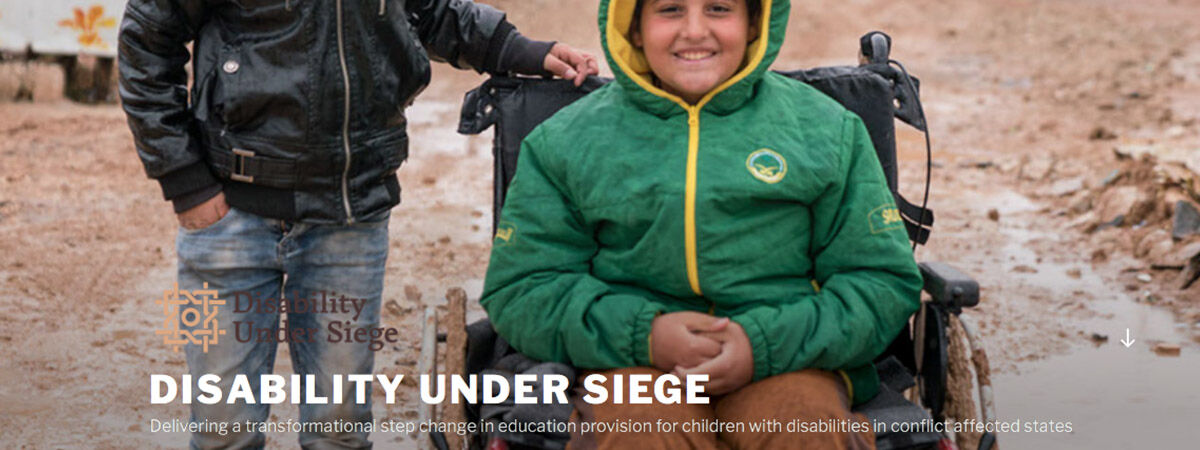Examining the role of arts and humanities in developing inclusive forms of education for children with disabilities.

Further information can be found at University of Birmingham's Disability Under Siege webpage.
Research project title: Education in Conflict and Protracted Crises (Disability Under Siege)
Funder: AHRC (GCRF Network Plus Project)
Duration of project: 2020-2024
Researchers
- Anthony Downey
- Dima Kiwan (Principal Investigator) - University of Birmingham
- Rita Giacaman - Birzeit University, Palestine
- Maha Shuayb – Centre for Lebanese Studies
- Nasmi Masri – Islamic University of Gaza, Palestine
- Deborah Youdell – University of Birmingham
- Kate Woodcock – University of Birmingham
- Ruth Gilligan – University of Birmingham
Research background
The project developed out of a series of conversations with colleagues regarding the role of art practices and cultural events in producing knowledge and disseminating ideas.
The focus thereafter was on how the knowledge produced within art practices can be understood in relation to multi- and inter-disciplinary research practices.
From there, the team co-created programme which brings together a community of researchers, educational practitioners, cultural organisations, members of disability groups, charitable and advocacy organisations in the UK and Middle East (Jordan, Lebanon and Palestine).
The four-year project will examine the role of arts and humanities in developing inclusive forms of education for children with disabilities.
As Cultural and Commissioning lead on the project, Anthony has been developing a number of interdisciplinary partnerships with practitioners and cultural organisations in the region, including the Qattan Foundation (Ramallah), Al Ma’mal (Jerusalem), Sursock Museum (Beirut), and the Queen Rania Foundation (Amman) to discuss how cultural practices can support a transformative discourse on disability while also enabling inclusive learning in global contexts of conflict and crisis.
How is the research being carried out?
The research to date has involved the identification of challenges related to education, proposed solutions to effect change, and routes to impact.
These have involved a series of conversations with regional organisations and stakeholders. In year one, we are focusing on building capacity in the region, and effecting a network that brings together cultural practitioners and disability organisations.
The selection of cultural and research partners in this project was designed to develop new forms of interdisciplinary research practices for promoting inclusive educational and group-led discourses with disability organisations in the region.
A central goal here will be the focus on developing communities of practice between cultural partners and disability organisations to effect a step-change in how disability is perceived in the region and how inclusive educational programmes can be effected as a result.
In collaborative partnerships with disability organisations, cultural partners will be instrumental with developing the Open Call for commissioned projects in relation to cultural events that can also deliver educational programmes.
Outcomes and impact
The research project has the overarching objective of providing the intellectual, financial and logistical resources required by local practitioners to deliver a transformational step change in education provision for children with disabilities in conflict affected states.
The intended outcomes include:
- Improved theoretical understandings of disability in different geographical and socio-political contexts, specifically those experiencing conflict. This will benefit researchers by improving identification, recognition and classification of disability. This will facilitate design of effective support processes across a number of sectors including education, health, and community.
- Development of arts and humanities methodologies to enable public education around disability as well as school-based interventions, as well as transforming cultural representations of disability.
- Providing better understanding of the factors impacting access to education; this would benefit researchers so as to prioritise strategies for shorter, medium and long-term change.
- Development of theories of inclusive pedagogy.
- Contextualised understandings of social change; benefitting researchers by enabling greater understanding the links between new knowledge production and how it translates into changes in educational policy.